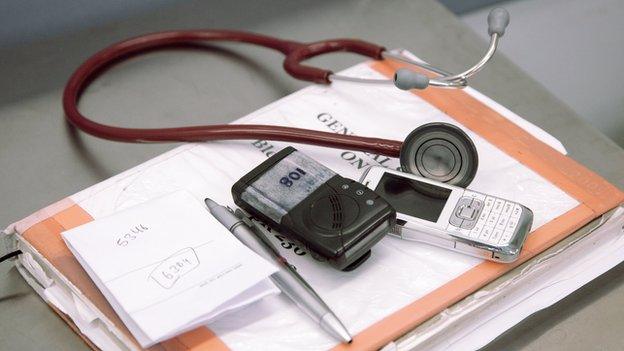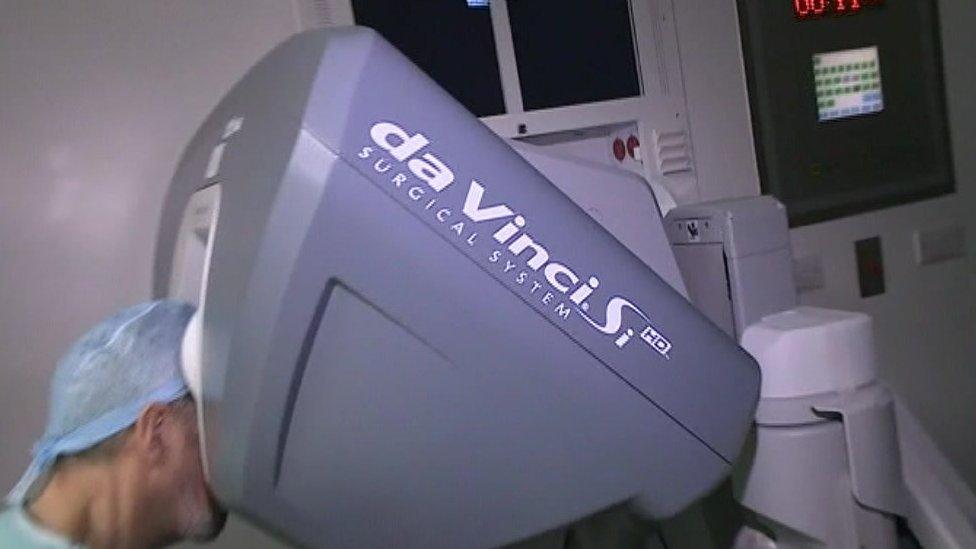Addenbrooke's Hospital consultants concerned over online records
- Published
.jpg)
The new computer system was designed so staff would not have to wait for printed patient records to arrive
A £200m online patient-record system has been "fraught with problems" and medics' concerns "seemingly overlooked", senior hospital consultants have claimed.
A letter seen by the BBC reveals management at Addenbrooke's and Rosie hospitals in Cambridge were told of "serious" issues last month.
It came after the hospitals transferred 2.1 million records in October.
The trust said "unanticipated" issues led to "more than teething problems".
The hospital is the first in the UK to use Epic's eHospital system, which is used in hospitals in the US.
The system went live on 26 October and is intended to allow medical staff to access patient records on handheld devices instead of waiting for notes.

Dr Keith McNeil believes that in a year's time staff will say "we're glad we did this"
A month later, a report by the county's clinical commissioning group found "a 20% drop in A&E performance".
It also found problems with some test results and and issues with pathology services.
Chief executive Dr Keith McNeil admitted there had been "more than teething problems" and "some of it was anticipated and some of it was unanticipated".
The "unanticipated" problems included problems with blood tests and "one of the busiest periods in the hospital's history", he said.
He added: "We're profoundly sorry about that... people will understand that you can't do an information technology implementation of this size without some hiccups.
"I think that [claims] patient safety was in danger was probably over-dramatising."
'Risk of harm'
The BBC has found many of the concerns were highlighted by the Consultant Staff Council in a letter to Dr McNeil and chair of Cambridge University Hospitals Trust, Jane Ramsey, on 17 November.
In his letter, Dr Sam Bass, chair of the council and assistant coroner, acknowledged the new system had "many good points" but said "serious concerns" expressed by fellow consultants "have been seemingly overlooked".
The introduction had been "fraught with problems", he said.
Dr Bass highlighted issues with blood transfusion and pathology services and asked if the "risk of the potential harm to patients [had] been discussed".
The council felt the hospital was "less safe than before the introduction of Epic".
"There have been issues with the introduction of this system and it appears that the trust have been less than candid about the problems faced."
'Significant issues'
Dr Bass asked for a "full account after the external review" of the system and called for improved communication.
In his reply dated 27 November, Dr McNeil acknowledged there had been "some significant issues" with the system.
He apologised for "disruption" and added: "Meetings have been held with the CQC (Care Quality Commission), Monitor and HM Coroner to make them aware of the issues associated with the go-live process.
"We recognise our duty of candour and have provided regular updates to these bodies and will continue to do so on a weekly basis."
Dr McNeil said the trust planned to bring in extra technical staff and American clinicians with experience of using eHospital, as well as more nurses, to "help us cope with the demand for services".
An external review into the system is expected to be completed in mid-December.
- Published5 December 2014

- Published24 November 2014

- Published27 October 2014

- Published15 April 2014

- Published16 January 2013
